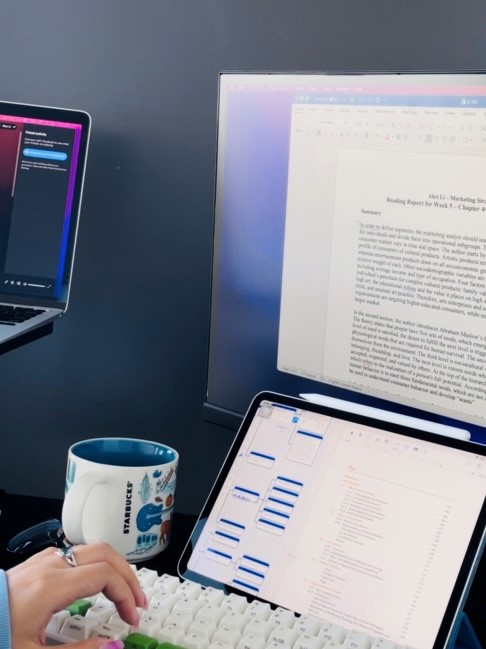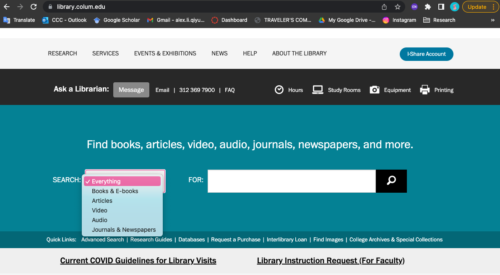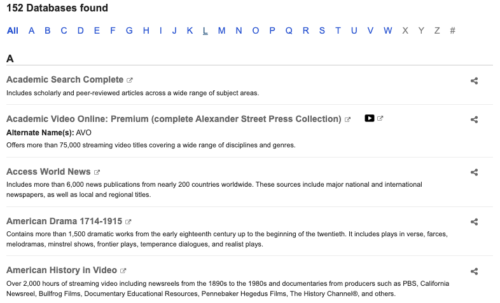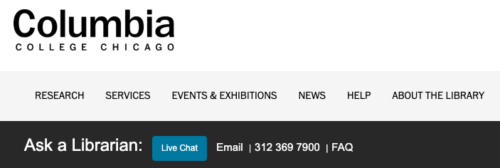
Research Like a Graduate Student
I came to Columbia College from an MFA program that was highly academic and focused on scholarly writing. Columbia usually promotes itself as a career-oriented, hands-on kind of school, but the ample research resources here amazed me. Whether your interests lean academic or you’re just wondering how to prepare a thesis, research paper, case study, or journal article, Columbia offers something for you.
Academic research is one of the hardest but also one of the best parts of being a graduate student. Research can be overwhelming at first, but doing it with the right academic resources can bring you to the Flow, the state of mind in which you become fully focused and immersed in learning. To be honest, I enjoy the process very much. Here are several resources I found extremely helpful when I was working on my independent study.
Faculty
Scholarly writing can be a lonely process. You spend the bulk of your time reading the literature alone, looking for a gap where you can slide in your paper, debating with yourself on hundreds of questions: will this title be too narrow or too broad? What if someone else has done this? Is there any value in my research? Will my paper be a fat piece of garbage? It is frustrating when a sparkle of an idea makes you the happiest person for a second before you put it down yourself. However, you are never alone. Every scholar I know has gone through this process. When you feel like you need to talk with someone, it is always the right time.
For a start, you can always reach out to the professors of your courses, and that is what I do most of the time. When I was stuck on the theme of my subject, I turned to one of my professors by taking advantage of office hours. The professor understood all my concerns and questions, and throughout the semester he shared names, cases, theory references, books, videos, and, most importantly, guidance and encouragement. Every week I read what he sent me, reflect on my subject, bring him new questions and go home with new inspiration. All this information led me to a brand new angle of research and eventually helped me finalize my research.
Library
Columbia has a remarkable digital library. Looking back on my research experience in the libraries of the Central Academy of Drama and the University of Chicago, I think Columbia has done a great job in building a library that exposes scholars to vast resources.
To begin with, the library is well-integrated. Why go to Google Chrome and get distracted by the ads and fake news, when you have access to a one-for-everything search engine where you can find books, articles, video, audio, journals, newspapers, and more?

Personally, I go to Databases where I can visit my preferred sources. Columbia subscribes to spot-on scholarly resources like ProQuest, Statista, and Lexis Nexis, where you can easily access the desired information for free with generated citations.

What is even better? Ask a Librarian—AKA “life saver,” period. You can ask Columbia’s librarians about anything when you meet obstacles during your research. When I started my subject, I had difficulty finding a nonprofit organization’s financial reports, which they had did not publish on their website. A 501(c)(3) organization’s reports should have been public information, but I had no idea which database to start with or what keyword to search for. So I asked a librarian by email. She got back to me in about half an hour and sent me three different public resources, including the organization’s annual returns from the last five years, exactly what I needed.

Tech Bar
I assumed I wouldn’t ever use the Tech Bar, because as a Business and Entrepreneurship student I have no need to borrow cameras or stuff like that. But last week, my professor lent me several DVDs I had no means to play, since laptops nowadays do not include an optical drive. That was the reason I walked into the Tech Bar at 623 S. Wabash. They welcomed me and brought the drive in around ten minutes. During the wait they even told me that Tech Bar can do more than lend equipment: they help can help install free Adobe and Microsoft Office apps, clean up computer hard drives to improve performance, and provide projection solutions for different computers.
